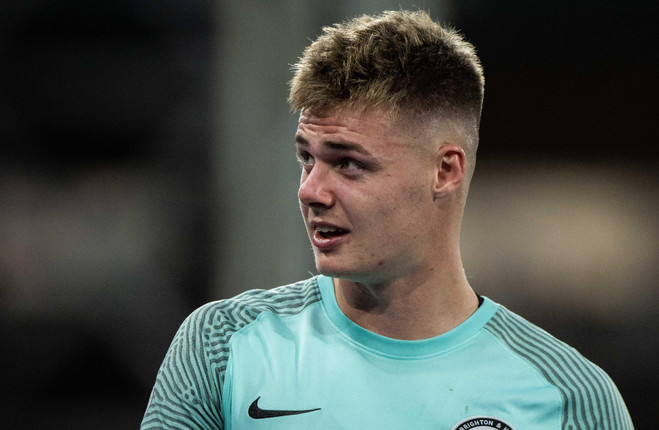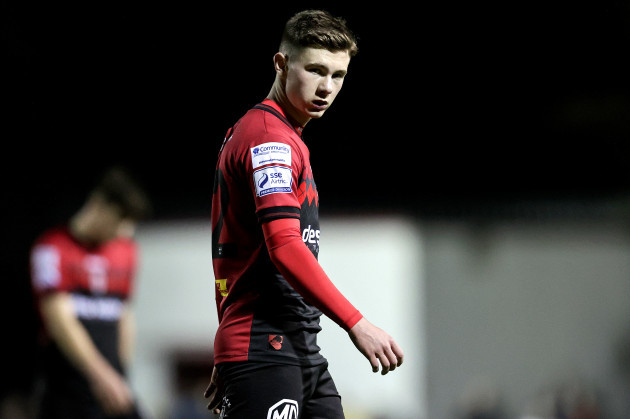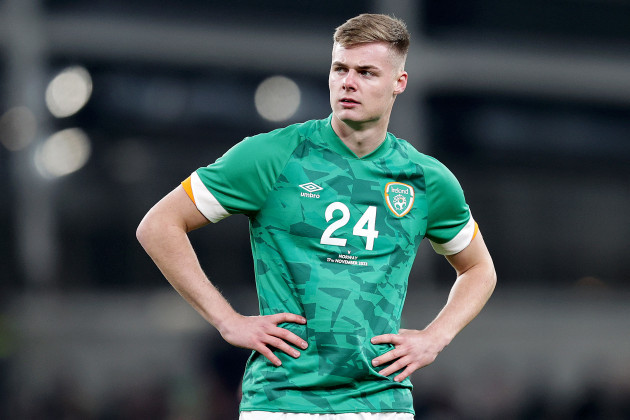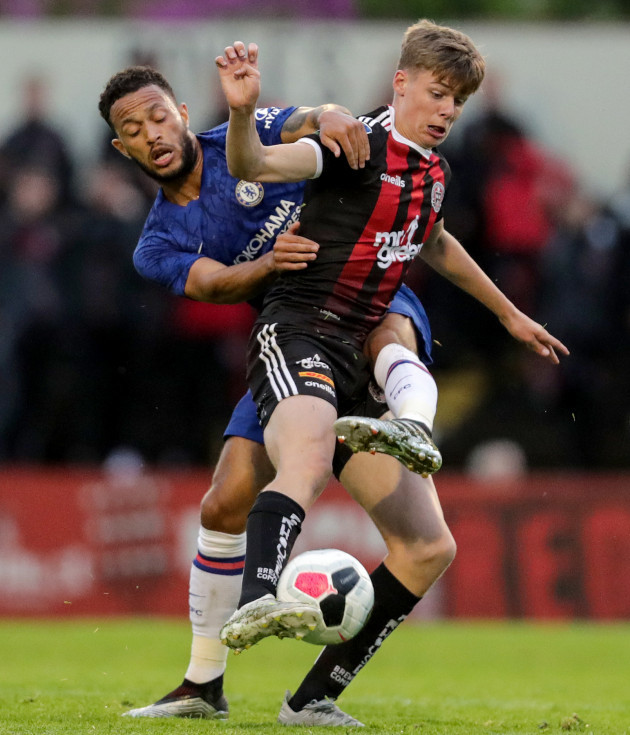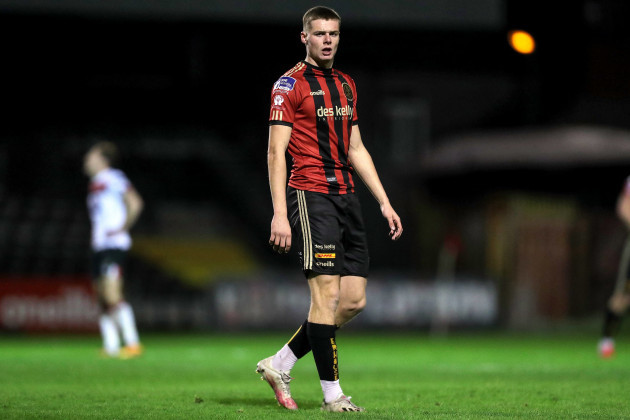ON TUESDAY evening, Karl Lambe’s phone suddenly started buzzing.
He was out training in his role as a coach with St Kevin’s Boys so was trying to ignore it, but over the next two hours, it wouldn’t stop.
The updates were almost relentless. Evan Ferguson had been selected for his first Premier League start for Brighton. He was bullying experienced top-flight defenders off the ball. He hit the post. He scored for a second consecutive game. He registered an assist as Brighton ran rampant against a beleaguered Everton side at Goodison Park.
Not a bad night’s work for someone who only turned 18 in October.
Yet Lambe has known the Meath native for over half his life. He first encountered a young aspiring footballer at the age of six — even then, he was big for his age.
“I still look at him as that kid. It hasn’t sunk in that he’s a Premier League footballer,” he tells The42.
“He’s just Evan. And when I see him and I’d speak to him quite regularly, he hasn’t changed one bit.
“I spoke to him after the game on Saturday [versus Arsenal], it was just the usual chat. There wasn’t any ‘I just scored a Premier League goal,’ or anything like that. And that’s the way he’s always been.
“So, for me, it’s immense pride and it’s great seeing a good person from a good family being rewarded for the hard work he’s put in over the years.
“I’m a massive sports fan and to see someone you know, someone you’ve coached for so long, scoring in front of your eyes like that and watching Match of the Day the other night and seeing Ian Wright talking about him and going through analysis on Evan’s movement, it’s bonkers.”
While it was largely a case of Ferguson repeating what Lambe has watched him do for 12 years now, there was one aspect to his performance that was surprising.
“He got involved in a bit of argy-bargy and I was laughing because that’s the first time I’ve ever seen anything like that with him. He’s always been a big lad, but he wasn’t a big lad that relied on being big to be good at football.
“He was technically really good off both feet, played in multiple positions and he only started playing up front at U12s or 13s. Before that, he played everywhere, — defence, the wing, midfield.
“He understood the game phenomenally well for someone as young as he was, and his movement was brilliant. The overlap he did for Brighton’s third goal on Tuesday, he was doing that when he was a kid.”
Ferguson was part of a St Kevin’s team that was exceptional even by the illustrious Dublin schoolboy club’s standards. While no teammates have reached their star striker’s level yet, several are playing abroad currently. They include Fiachra Pagel (Forest Green), Seán Grehan (Crystal Palace), Eric Yoro (Bolton) John Ryan (Sassuolo), David Okagbue (Stoke City), Jamie Mullins (Brighton), and Cian Kelly (Derby). Rivals Cherry Orchard weren’t bad either, with Tommy Lonergan (St Pat’s) and Ben Quinn (Celtic) among their contingent.
“Sometimes you just get really lucky and that 2004 group are all mates, they still talk to each other — we won two All Irelands and lost an All-Ireland final playing a year up one year,” remembers Lambe.
“It was a pleasure coaching them and they kind of just dragged each other along and I think that’s the reason why so many of them are doing so well.
“Jamie’s gone to the right club [his move to Brighton was confirmed during the week] as well with Evan being there because he must have set up half or three-quarters of Evan’s goals at schoolboy football over the years. So hopefully, they can link up with Brighton in the future and Ireland as well.”
Perhaps another reason for that Kevin’s team’s success was the fact that they regularly came up against high-calibre opposition. For instance, during one 12-month period, Ferguson and co faced a Barcelona team featuring current Spanish international Gavi on three occasions.
Man City, Man United, Marseille, Real Sociedad, and Maccabi Haifa were among the other teams they encountered in big international tournaments.
It was during one of these matches in particular that Lambe started to feel confident a career in professional football beckoned for Ferguson.
Having emerged from a group that included Genk and Marseille before beating Deportivo La Coruna in the semi-finals, they faced Gavi’s Barcelona in the final of the Academy Cup. Ferguson had already dominated teams and bagged plenty of goals but this climactic encounter would prove his most memorable game of the tournament.
“We were 2-0 down with five minutes left and Evan scored two goals to make it 2-2, bringing it to penos. Unfortunately, they beat us on penos. But we were playing Deportivo and Barcelona, and he’s scoring against them.
“It was then I thought: ‘there’s something here’. And then we played the All-Ireland final a few weeks after that against Joey’s Boys and he scored a cracker, an outstanding goal, top corner right across the keeper, just little things like that where you’re saying ‘these are big moments in big games’ and not only against our teams but continental teams.”
Yet at an even earlier age, Ferguson was being tipped for greatness, as Lambe explains.
“Whenever we played in a cup semi-final or a cup final or big league game, you knew you had a goal, you knew he was scoring. ‘Evan’s going to score today,’ that kind of thing.
“I moved house recently and there was a newspaper clipping I lost from when we were at U8s. And he scored four goals away to Mount Merrion and the headline was ‘Evan sent for Kevin’s’.
“This is from April 2012. So you’re talking 11 years ago nearly now and the journalist starts with ‘remember the name, Evan Ferguson.’”
And while Ferguson is no longer living in Ireland, he has not forgotten his old coach or the role his former team played in providing a pathway to Premier League glory.
“A few months back, he said: ‘I’m home. Are you around?’ And I said: ‘Come down to Kevin’s’. He met the 8s, 9s, 10s, 11s, 12s. And they just idolise him now, he’s a phenomenal role model because that was him literally 6-8 years ago, it’s not that long ago that he was where they are.”
Bohemians had a link with St Kevin’s Boys at the time and so it was no surprise when Ferguson graduated to play for the League of Ireland club.
Then-manager Keith Long and his staff were well aware of the youngster’s prowess, having watched him line out in schoolboy football on a number of occasions.
Consequently, both player and club attracted headlines when Ferguson was given a 62nd-minute debut off the bench during a high-profile friendly with Chelsea, who were at the time managed by the same coach the player came back to haunt during the week — Frank Lampard.
The decision to play Ferguson at such a young age was met with some criticism but Long feels the controversial call was justified.
“Did I think for a second people would question putting a 14-year-old into a men’s first-team environment? I didn’t even ask that question, I didn’t have to. Because in my mind, with the backing of his parents, it was the right thing to do, and it was the right thing to do for Evan.
“I think there was some sort of reaction, certainly when Evan played against Chelsea and made his debut for Bohs in the league [away to Derry]. There are arguments on both sides but ultimately I was guided by Evan and his parents. We made a football decision because the boy was ready to play football. And if the player is good enough, he’s old enough.
“Looking at him physically you don’t see a 14-year-old, but obviously then there’s the mental side of things.
“And Evan was very focused, very driven. It didn’t faze them whatsoever to be involved.”
It was a Chelsea team that featured plenty of big-name players but Ferguson still held his own.
“You could see his eyes light up when he was coming off the bench and he knew that this was the moment,” adds Long. “He went out and he did exceptionally well in front of a decent crowd, a lot of his peers were in the stadium that night watching on, so it’s a great story.”
The then-team captain Derek Pender, who was part of the Bohs side that day, recalls: “When he came into the first team and played that Chelsea game, obviously physically he stood out. He was holding off Kurt Zouma, a centre half and that was probably the first time where you really realise: ‘Jesus he’s a beast for a young fella.’
“He had no fear in trying to get hold of the ball when he was on the pitch, he was just so driven and wanted to make an impression, which he obviously did.”
Ferguson subsequently worked under Pender after the latter became manager of the Dalymount Park outfit’s U17s team, helping them wrap up the league title just before his big move to England.
“I was lucky to be given an unbelievable group at U17s, I had Evan, Jamie Mullins, Seán Grehan,” recalls Pender. “Evan now is the most high-profile because he’s scored in the Premier League, but there was a good group of young players there.
“Working with them all was a challenge for me because it was my first job, but it was just a joy to work with the quality of player that I had, and obviously working with Evan, trying to drag him off the training pitch was probably the hardest part.
“I remember one time during the lockdown, he was out playing with his mates on the street, and then he’d get called into the first team, or else he’d be training with the 17s. Sometimes, he was overloading himself. Even when he was injured, he was still trying to play because of his hunger for the game as he’s only a kid at the end of the day, but that was it. That was the hardest part of managing Evan, it was trying to get him to relax and take a break.”
Ferguson only made four competitive senior appearances for Bohemians in total. One moment that stands out for Long is when he was denied a first senior goal in harsh circumstances.
“The disappointing thing from our perspective, at that particular time, was that Evan had a goal disallowed on his first start against St Pat’s in the derby game. He scored a perfectly good goal and it was chalked off for whatever reason.
“I will always remember Evan’s reaction at the end of the game, when I spoke to him, he was disgusted with the decision, he couldn’t believe the referee got it wrong. And most importantly, you could see in his eyes that it meant a lot to him, to be the youngest ever player to score for Bohemians. It gave me a little insight into his personality, that steeliness, that resilience, that determination to become a professional player because that [would have been] a milestone in his career.”
Another fascinating aspect of Ferguson’s rise is that unlike the vast majority of Irish footballers now, he moved to England at 16. Since the implementation of Brexit, individuals from Ireland have had to wait until they turn 18 to sign for teams across the water. However, the Brighton starlet was an exception to this rule owing to the fact that his mother was born in England.
It, therefore, seems unlikely that Ferguson would be currently lining out for Brighton’s first team if, like other Irish players, he had to stay at home until turning 18.
“It is very difficult for us to compete with academies in the UK,” says Long. “We don’t have the resources. We’re nowhere near that level. And that’s the challenge for us post-Brexit. Players will remain in the country. They won’t go away at 16 anymore. They go away at 18. So we have got to make sure that players don’t lose out in terms of development.
“We’ve got some really good people working at football clubs. We need more investment by clubs, the government, Sport Ireland, and the FAI, and we need more investment into academies.
“We need to work with the players, to increase our contact hours with players, and lots of academies are doing this. And they have been doing this for the last number of years. But I suppose when you benchmark it against some of the category one clubs in the UK, the argument you can have here is: would Evan be playing in Brighton’s first team had he missed out and didn’t go at 16?
“Obviously, Jamie Mullins has moved [during the week]. So he’s going in two years later, and he’s three weeks older than Evan, so it will be interesting to see how he develops.
“Brexit has given us challenges, but it also gives us opportunities. It’s an opportunity for clubs to show that we can develop and produce players.”
Lambe agrees that this predicament is a concern for Irish football.
“We don’t have the knowledge in this country or the facilities. So Evan went to Brighton when he was 16 and I remember people saying: ‘What’s he doing going to an academy? He could stay here and play first-team League of Ireland football.’
“And I’m saying: ‘No offence, but stay here and train three nights a week in Blanchardstown IT on half an Astro pitch?’ But he goes to Brighton and has about 25 staff looking after him. He’d be training every day, twice some days in a multi-million-pound complex. Everything he does is monitored. But instead of doing that, he should stay and train with part-time players?
“There’s no one-size fits all, so definitely for some lads, staying, doing the Leaving Cert, going when they’re 18, 19 and 20 suits. But for the likes of Evan, that would have never suited him. He needed to get out of there as soon as possible.
“And you would see that yourself when you’d play English academy teams. We’d always give them a game up until U13s or 14s. But then after that, their contact hours, the sports science, the sports psychology, the levels they’re playing at, the amount of football they’re exposed to takes off.
“And after U14s, 15s, you’d almost be plateauing a bit and the English lads have taken off. And that’s where when your best players could give themselves that opportunity of going away. But it’s gone now.
“And you go to an English academy, and you see the pitches. I’ve been to Man City and that’s space age. You can’t compare anything to Man City — I’ve never seen anything like that in the world.
“But you go to a Championship [club] or a Fleetwood, and we have nothing that compares even to the Fleetwood Academy — we have to get up to even that standard.
“Now, obviously, people will say: ‘For every one Evan Ferguson, there are 25 lads that go over at 16, and come back at 18 with no Leaving Cert, no education, on the scrapheap, they think they’re a failure.’
“But I’m just talking for the upper echelons and how are we going to get Ireland to kick on and make World Cups and European Championships, it’s that 1%, the likes of Evan and these lads [that make the difference].”
